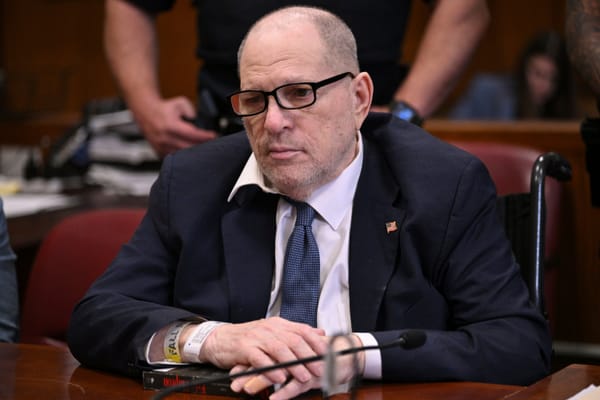Five years ago, at the height of #MeToo, we sat through every day of Harvey Weinstein’s sexual assault trial in the Manhattan Criminal Courthouse. It is a bleak place, with its physical decay matching the broken-down justice system we saw inside the building. In Courtroom 99, where the Hollywood producer’s fate was decided and he is now facing a retrial, there were never enough seats, so we had to start lining up outside at 4 a.m. just to secure a spot in the stuffy, badly lit room with terrible acoustics.
But what was even more depressing as the trial unfolded were the obvious injustices being piled upon Weinstein in a rush to convict.
Back then, the courtroom wasn’t a sanctuary of justice but a stage for social justice. It was a bizarre trial where the mob thirst for vengeance overhung and overwhelmed the flimsy and often contradictory evidence. And the mob was at times literal—not just metaphorical. The jury could often hear the screams of hundreds of women gathered outside chanting for vengeance on behalf of their sex. There was a febrile atmosphere inside the courtroom and the prosecution was aided by a judge who seemed determined to ensure not justice but a popular conviction.
The judge allowed witnesses, such as the actress Annabelle Sciorra, to make allegations so distant in the past and so vague that he could not be charged with them. They were so-called “bad character” witnesses, and their cumulative effect was to ensure that the jury had no doubt Weinstein was a monster.
“A courtroom is not about judging morals.”
Don’t get us wrong. Weinstein lived an amoral life. He cheated on his mistresses. He offered movie roles for sex. But a courtroom is not about judging morals and we could see a miscarriage of justice occurring before our eyes.
Swept up in the need for a “national reckoning” against powerful men, the jury delivered the required verdict. But the reality is that the actual charges Weinstein faced were incredibly weak (that’s why they needed the “bad character” evidence to boost the weak case). Aspiring actress Jessica Mann alleged a rape at the Doubletree Hotel in New York on March 18, 2013, and an assault at the Peninsula Hotel in Beverly Hills in 2014.
But Mann admitted that she joined Weinstein for brunch a few hours after the alleged New York attack appearing composed. Her friends at the brunch said they noticed nothing untoward. She then extended her stay at the hotel in order to attend the Weinstein-produced August: Osage County movie premiere and then met him the following day for his birthday.
After this meeting she sent nothing but friendly, warm emails. In September, 2013 Mann wrote, “Hope you are well, call me anytime, always good to hear your voice,” ending with, “Miss you big guy.” In November, she shared personal updates about her father’s illness and new partner, stating, “Thank you for your unfailing support and kindness. It has helped me believe in myself.”
Over the next few years she shared her new phone numbers on the five occasions she got a new phone. To her therapist, she described Weinstein as a “father figure,” She even wrote to him saying she wanted him to meet her mother.
She also claimed (but the jury rejected the allegation) that she was raped by Weinstein in Los Angeles in 2014. Shortly after the alleged assault, Mann emailed about a haircut she gave Weinstein, saying, “You are the one who makes it look good with your smile and beautiful eyes. But thank you, that makes me so happy to hear,” adding a smiley face to the email.
In fact, she wrote nothing but friendly emails right up until the first #MeToo article appeared in 2017. Then the tone changed, and she wrote to friends about the need to file civil charges seeking damages before the statute of limitations ran out.
Weinstein was also convicted of sexually assaulting aspiring producer Miriam Haley at his Soho apartment on July 10, 2006. Again, Haley’s behavior after the alleged assault suggested a consensual relationship. The day after the supposed assault, she accepted a Weinstein-funded flight to Los Angeles, returned on another Weinstein ticket, and met him on July 26, just over two weeks later, for consensual sex. She was also discovered to have tampered with her calendar to obscure references to meetings with Weinstein that would throw doubt on her allegations of assault.
Just like Jessica Mann, she sent nothing but loving emails to Weinstein and had several consensual sexual encounters with him over the next several years. She let him know she would be at the Cannes film festival at the same time as him and that she “would be in a private apartment” even though she claims to have been previously been raped by him. She also told the court that she may sue for damages after the trial.
But “believe all women,” we were told in those febrile days, and the jury did what it was told. The media played its part, too. There were over 100 journalists in court, but almost none of them allowed any skepticism to color their reporting. Eventually, last year, the New York Court of Appeal threw out the convictions against Weinstein.
The retrial, which is starting this week, is a chance for Weinstein finally to face evidence-based judgment, not mob rule. The same women are apparently giving the same accounts of their assaults and perhaps this time Weinstein will be tried on the evidence, not on a need for vengeance against all men.
The legal system isn’t supposed to be governed by mob passion—it’s supposed to facilitate the search for truth. The prosecution’s case was rejected in 2024. Here’s hoping it stays rejected. Weinstein should walk free—not because he is a good person, but because justice demands proof, and proof in this case is lacking.
